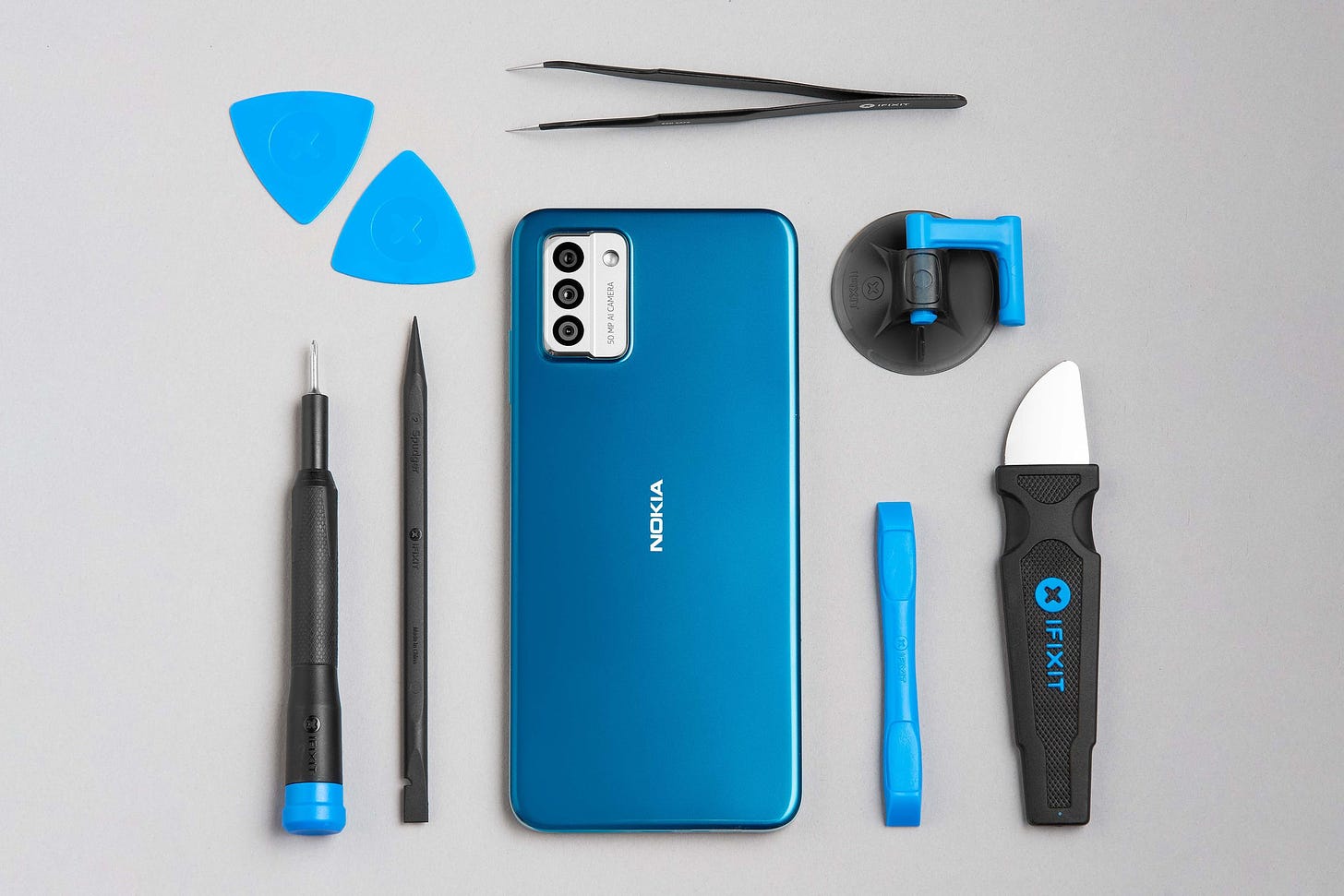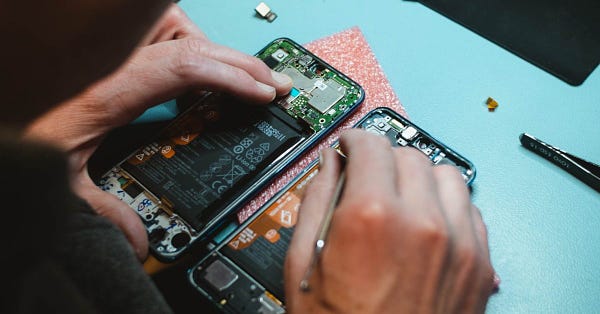More than six billion smartphones on Earth, but who will fix them? Week in Repair
The UK looks to device repair apprenticeships to launch the next generation of fixers. Nokia releases a repairable phone alongside iFixit and Right to Repair bills charge ahead in state legislatures.
There are 6.92 billion smartphone users worldwide - that’s 86.34% of the world’s population owning a smartphone. The average lifespan of these devices is around 2-3 years, which means it’s likely those billions of devices will end up in the growing mountain of e-waste in the near future. And that turnover will drive more harm - like the extraction of the raw materials needed for replacement smartphones, activity that often brings with it human rights violations.
Of course, repairing rather than replacing and ‘recycling’ old devices will greatly reduce the need to dispose of- and replace devices like phones. The challenge: finding someone to do that repair, according to Consumer Reports:
“Just 16 percent of Americans who had a phone break in the past five years say that…they fixed it at home or got it repaired professionally, according to a new nationally representative survey”
An apprenticeship model for smartphone repair
What is needed are more repair professionals. This past week, Repair firm TMT First called for an official device repair apprenticeship to be introduced in the UK, pointing out there is no industry training standard. The company, which has introduced its own apprenticeship after struggling to find staff, says there is potential for people with tech skills to create careers repairing mobile phones and other devices, adding that when taught correctly, these devices will last for longer.
In fact, repair-focused careers are already in high demand. The Bureau of Labor Statistics found that US workers in 2021 who were “Electrical and Electronic Equipment Mechanics, Installers, and Repairers” earned $10,000+ more than the average worker that year.
Other News
Right to repair legislation charges ahead: proposed right to repair bills for agricultural equipment and electronics moved ahead in a number of states in recent years. Notably: the West Virginia Senate passed an equipment right to repair law on March 1st; the Minnesota House advanced a proposed right to repair bill, HF1337, on February 28th. Senate hearings on a companion bill, SF1598 are pending. In Washington State, the Fair Repair Act (HB 1392), which would require manufacturers to provide consumers and independent repair shops with the parts, tools, and information necessary to fix electronic devices, passed out of committee by a vote of 18-12 on February 23rd.
Nokia released a new fixable smart phone: The Nokia G22 boasts quick battery and screen replacement due to its pro-repair design. The phone is based on a partnership between Nokia and iFixit to make common smartphone repairs easier. While the phone is more repairable than some competitors, it still requires tools to remove the battery, and HMD will stop offering software support before companies like Samsung and Google. HMD has also announced two more affordable C-series phones and plans to manufacture select phones in Europe for security and sustainability reasons.
Medical device reprocessing is the cleaning, testing, and repackaging of single-use medical devices. It is regulated by the FDA, which has found reprocessed devices to be as safe and effective as original devices, leading healthcare providers to use fewer resources, reduce costs, waste, and greenhouse gas emissions, and strengthen the healthcare supply chain.
Remanufacturing electronics can help businesses save money, become more sustainable immediately, and break the cycle of unsustainable consumption and needless e-waste says Steve Haskew at betanews. Developing a sustainable consumption and production model that bears in mind reuse could address the e-waste crisis, but support from government will be key to foster and drive change.
The REPAIR Act, a federal bill co-sponsored by Rep. Marie Gluesenkamp Perez would give owners and their repairers of choice access to necessary tools and information to repair their devices, and Perez argues that this is part of the American heritage of being able to fix things and own what we buy.
Formerly a scientist in the corporate oil and gas world, Ramya Venkataraman left her job to join environmental charity to help spearhead The Wheel, an initiative that includes repair cafes to reduce waste and promote reuse and recycling, with a focus on helping smaller businesses become more resource efficient and connecting community venues with people who can repair and upcycle furniture and fabric for them.
Just Zero has released templates of six bills to help improve waste management infrastructure in the US, which includes proposals for packaging reduction and recycling act, deposit return schemes, anti-incineration laws, single-use plastic restrictions and food waste reduction policies, to tackle the growing plastic pollution crisis.
🎧 Listen to our podcast episode where we discuss the U.S. waste management system.
Copyright law backfires as Lego issued DMCA takedown notices to YouTube videos reporting on a leaked Zelda-themed Lego set, which only confirmed the leak's existence and resulted in more coverage of it.
Restart Podcast Episode 84 is out: The folks over at The Restart Project have a new podcast out featuring Katie Bellaris from Re:Make Newport, Elaine Brown from Edinburgh Remakery, Sue Briggs from The General Store Selkirk, and Lorna Montgomery from Share and Repair Bath to talk about their experiences setting up high street (what Brits call “Main Street”) repair projects in their area.








